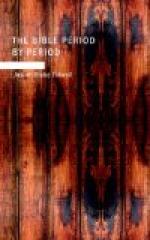He may have secured his reward, however, in another way. He seems to have led Balak to entice Israel, through pretensions of friendship, to partake in the idolatrous and impure festivals of the Moabites (Num. 25:1-5; 31:15-16; Rev. 2:14). These and other acts of their own brought down upon Israel the curse of heaven and made them the subject of such calamites as Balaam could not himself pronounce against them. By suggesting this course to Balak, he may have obtained the coveted pay without directly disobeying God. This whole story would seem to imply that the Hebrew historians did not believe that divine relations were limited to seers and prophets of their own race.
The Last Acts of Moses. Events are now transpiring in rapid succession and the story hastens to the close of the career of Moses, the great leader prophet, priest and judge of Israel. Several matters are worthy of study: (1) The sending of an expedition to destroy the Midianites. (2) The final numbering of the people preparatory to their entrance into Canaan. (3) The appointing of Joshua as his successor. (4) The settlement of the two and a half tribes on the east side of Jordan. (5) The appointment of the cities of refuge. (8) The delivery of a farewell address, or of farewell addresses.
The Last Scene on Moab. There were far too many of the Israelites to hear his voice and he probably gathered together the princes and elders who listened to him from day to day, each of whom went home and repeated to his own people what he had heard from their inspired leader. In these addresses Moses recounted their wanderings and Jehovah’s goodness to them. He reminded them of all that God had commanded them in his law and gave such new instructions and interpretations as would be needed in the new conditions that they would meet on coming into the Promised Land. He painted in frightful colors the fearful doom that would befall the disobedient and eloquently described the blessing of loyalty to God. After being called of God to depart into the mountains and die, he pronounced in one of the most beautiful passages in all the scripture, his farewell blessing upon each of the tribes.
And how solemn must have been the occasion. They are listening for the last time to his voice. With what veneration they must have gazed on him. He it was that Jochebed with loving hands had laid in the bulrushes when 120 years ago Pharaoh had persecuted them. He was the man that had so nobly chosen to suffer affliction with the people of God instead of the attractions of Egypt. His eyes under the shadow of Horeb had looked on the burning bush. His hand had stretched out over Egypt and overwhelmed it with the plagues. His was the face that had reflected the divine glory of the mount after forty days of fellowship with Jehovah, during which he received the substance of the law. That was the faithful and tried man that had often been wrongly accused, that had meekly borne so many trials, that had guided the people so faithfully, and advised them so wisely, and had refused honors himself because he loved them so well. How they must have hung on those last words! And the echo of his last words had hardly died away until his spirit had been called away and unseen hands had laid his dust in an unknown tomb.




